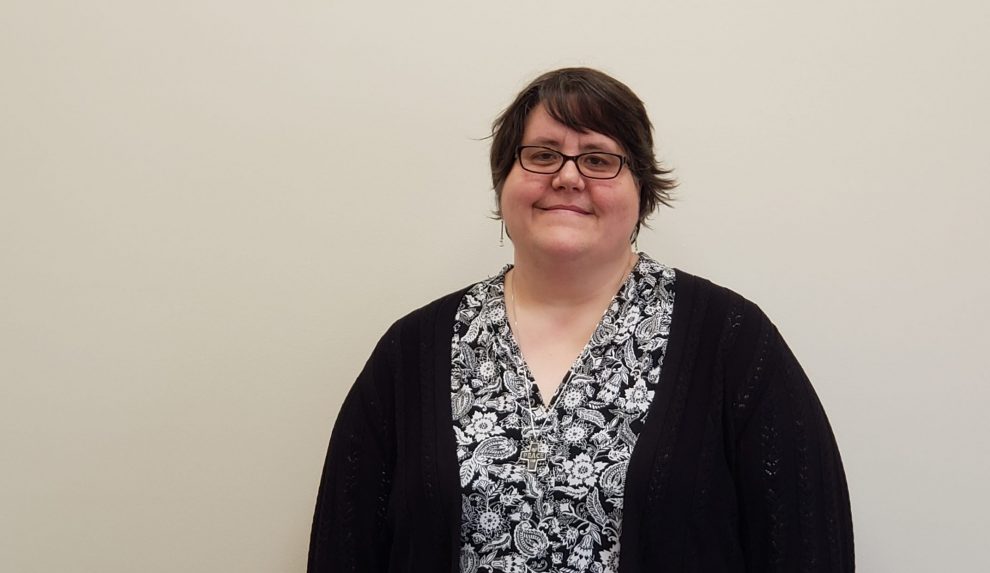Sister of Saint Joseph of Peace Susan Francois grew up knowing that the Catholic faith is connected to making the world a better place, but she probably didn’t expect she would be using her voice as a woman of the Church to influence public discourse on Twitter, one of the world’s top social media websites.
A member of her congregation’s leadership team, Francois already had a schedule packed with commitments for her various roles in full-time ministry when she decided to add one more non-traditional ministry to her day: She would tweet (the action one takes on Twitter) a prayer message at the current occupant of the White House every day of the 2017-2020 presidential term.
What started as a project in personal accountability and spirituality has become a public witness to how we can—and should—pray for others, especially those with which we don’t necessarily see eye-to-eye.
Francois writes at susanandstjoseph.com and tweets @susanfrancois.
What motivated you to begin tweeting daily prayers at the president?
The weekend of President Trump’s inauguration I was sitting in the lounge at O’Hare Airport in Chicago, and the president was tweeting. Everything seemed very crazy. I found myself getting less and less peaceful. I am a Sister of Saint Joseph of Peace—our charism is to promote peace in church and family life and in society!
I thought: If I can’t be peaceful myself, how on earth am I going to make it through four years of chaos (which is what it seemed like we were heading toward, and I think that prediction was correct)? I just said right there, “I’m going to tweet.”
How do you decide what to include in your tweets to the president?
It depends on what’s going on in the world. My prayer practice for the president is intertwined with my personal prayer practice. As long as I’ve been a member of the Sisters of Saint Joseph of Peace, I’ve “prayed the news” as part of my prayer and spirituality. I’ve always read the scriptures or the office of readings in the morning alongside what’s happening in the world, and I pray for specific people in need, for areas of need, and for conflict.
For example, on June 4, 2020, I tweeted: “Dear @POTUS, praying you experience & understand that all people are beloved children of God with inherent dignity. This includes those you may demonize/disrespect. You too are a beloved child of God. I pray you grow in this understanding, for you & all of us.”
That came after reading the newspaper and scrolling through Twitter and seeing so many peaceful protests in response to the murder of George Floyd. I saw one clip of people in front of the White House singing “Lean on Me” as the sun set behind them. I saw a clip of a bridge across the river in Portland, Oregon—where I lived for many years—completely covered with people laying down with their arms behind their backs for nine minutes. Portland is the whitest place I’ve ever lived, so I know those are mostly white allies. I also read about people in Washington, D.C. who opened their doors to teenagers that had been protesting and who were fleeing from the police.
That day, I contrasted all of these positive stories with the president’s tweets. I couldn’t reconcile a place of peace with what the president had been doing, particularly during that week.
Still, I know the president is a child of God. I know everyone with whom he disagrees is a child of God. So that was my prayer. That was the basic level I could get to on that day.
What’s the hardest part about tweeting these prayers every day?
Sometimes I really just want to scream and shout. I don’t always want to read the news, but I don’t feel like I can write the tweet if I haven’t prayed, and I can’t pray if I don’t pray the news. So, the hardest part of it is really the best part of it. It really does make me try to be a faithful citizen.
I can always pray for the president to serve the common good, to experience himself as a beloved child of God, to seek justice, to seek peace. But sometimes it is very difficult when my prayers and what our Catholic social teaching and scripture tell us seem so contrary to what I read happening as a result of the United States’ government’s policies or President Trump’s own statements.
Sometimes I have to pray a little bit more to be able to get somewhere where I feel like the tweet can be something meaningful. Sometimes I have no words. In that case, I usually go back to scripture: God understands our groaning (Rom. 8:26).
You can’t fix the world in 280 characters (the allowable number of characters in a single tweet). You can’t carry the burden of saving the world all by yourself. But if we open ourselves, the Spirit guides us to where our prayer needs to be.
I will honestly say I spend a lot more time praying than I do tweeting. The tweets just come after the prayer.
What were your hopes when you started this practice?
From the beginning I wanted this to be as nonviolent of a prayer response as possible. Initially, I wanted to keep myself calm and centered and engaged. I wanted to prevent myself from the temptation of tuning out. I wanted to stay focused on the common good.
I knew intuitively that sending these tweets would help me to be human through what I feared would be an inhuman time. We all can be tempted to see the worst in people and not to see their humanity.
Have you gotten any surprising responses?
I have a number of people who argue with me, saying that the president is not understanding, that prayers aren’t working, and that God can’t fix the president. That kind of response tells me about our lack of understanding of prayer and free will and our underdeveloped understanding of our relationship with God. The very act of praying is an act of solidarity and faith and hope, and in itself prayer has an impact whether what I pray for happens or not.
I’ve received more positive responses than hate mail. I had one woman write that she had gone to confession because of her anger. The priest told her to go look at my Twitter feed as penance. Then she wrote me to say, “How do you do that?”
It surprises me that this public practice that I started for myself has been meaningful to other people.
How do you do that—maintain a measured and charitable tone when tweeting about such emotionally charged issues?
I had a priest friend many years ago who, when my mom was dying and I had a lot of frustrations and anger with God, said, “Read the psalms, because people were pretty angry there.” Anger and righteousness in the sake of justice have a place in our prayer.
At the same time, there’s so much division in the world.
The spirit and charism of my congregation is peace. We have been studying and committing ourselves to nonviolence for as long as I’ve been in the congregation—specifically nonviolent communication and nonviolent language.
As I have evolved with this practice, I have become more aware of the things people feel free to say about public figures. Part of my trying to find that measured voice is to be a model and a witness for peace.
If we’re really upset with divisive language, polarization, and hate speech, why on earth would we return it? As a Christian, that’s not what Jesus would do. Jesus was righteously angry when he needed to be, but he also advised us to turn the other cheek and to love both our neighbor and our enemy.
When I started, my tweets were more matter-of-fact messages. About a year and a half in, I started tweeting to the president as a person. That has helped me.
Do you consider your tweets to the president to be a ministry?
I do. I’m a writer. I write for Global Sisters Report, and I’m working on a couple of book projects. So writing is one of my ministries. If I had more time, writing to encourage social action and promote Catholic social teaching would be an even bigger ministry for me. Given that my schedule is often very full, my tweeting has definitely become a ministry.
Has your tweeting changed the way you act offline?
The tweeting project, just by its very sustained nature and the fact that I do it every day, has been a theological experience for me. It’s grounded in our reality, just as Jesus grounded himself in our reality. It’s incarnational in a way that I never would have expected.
I have found myself wanting to challenge my loved ones to think about what they’re saying, the patterns that they’re inadvertently replicating, and the division to which they’re contributing.
Catholicism’s huge, prophetic, challenging statement that every single life matters, that every single person has inherent human dignity, and that every single person deserves respect is very hard to live out in our civil discourse. But the concept of being a good person is really very simple. This tweeting process has reminded me of that again and again.
Why is it important to pray for people in positions of leadership?
The Sisters of St. Joseph of Peace have always prayed for our political leaders. When I entered religious life, George W. Bush was the president. I remember one of the older sisters in the community, Sister Johanna, would always pray for the president, Congress, and the administration during our morning office. When Barack Obama became president, she prayed for him. I’m sure she still is praying in heaven.
We can always disagree with politics or policies: My role as a citizen is to try to be a faithful citizen in line with Catholic teachings.
Why is it important to pray for those with whom we disagree?
It’s important to pray for those with whom we disagree—not just in the political sense, but in our lives and our relationships—because God created us as one human family. Scripture says that if you’re angry with your brother, go home and reconcile first before you come to God (Matt. 5:21–26). Jesus said, “Pray for your enemies” (Matt. 5:44): It’s part of what we’re supposed to do.
It’s easy to pray for people you love. It’s hard to pray for the parts of yourself that you don’t love. It’s hard to pray for the places of systemic injustice that we don’t like. If it’s hard to do something spiritually, that might be a clue that we have room to grow there.
Are there any dangers in social media?
Social media is very powerful and we as consumers need to be as careful reading and watching social media as we are reading the newspaper or watching television. The lazier we become as consumers of information, the more danger there is.
One of my biggest concerns about social media is that we’re in a self-affirming echo chamber if we choose to be. Twitter is my favorite platform for getting viewpoints outside of my own bubble. I follow people with whom I wouldn’t agree in a debate, but they give me a wider sense of what’s going on. I think we all need to be challenged.
What is the role of social media in creating social change?
If we believe that our faith has something to say to people today about speaking out for the least among us, having a preferential option for the poor, and respecting and protecting all life at all stages—things Catholic tradition calls us to—then it’s important to be in the public square, which has moved to social media. That being said, there’s also a lot of negativity and disinformation on social media. It is now a responsibility of the church and of moral leaders to have a presence on social media.
Pope Francis totally gets this. Pope Francis having his almoner go with a truck to provide food during the pandemic was a photo op: It sent a message. Pope Francis standing in front of the empty St. Peter’s Square, giving his blessing, encouraging people to stay home while reminding them that they’re still connected to the church was using social media for a purpose.
Our founder of the Sisters of St. Joseph of Peace, Margaret Anna Cusack, was a prolific writer. We were founded in 1884, but by 1870, she had over 200,000 copies of her works in circulation. She started writing lives of the saints and histories and then she moved into social reform. There’s a reason why I’m in this congregation: I often think that if she was alive today, she would be on social media.
Are there risks to being involved in public conversations about faith and politics?
The risk of anyone who lives their faith in the public square is that it’s not always popular. It doesn’t fit into the boxes.
People may presume that because you’re at a peace march that you’re not pro-life or that because you’re pro-life you wouldn’t be at a Black Lives Matter protest. The Catholic tradition is much more nuanced than that. It’s based on values that don’t fit political boxes.
You have to be prepared to take misunderstanding, criticism, and praise that you might not deserve and to trust that if you’re truly living out your faith as best you can and are open to learning and informing your conscience, then there’s a purpose in what you’re saying that’s bigger than yourself.
Image: Susan Francois













Add comment